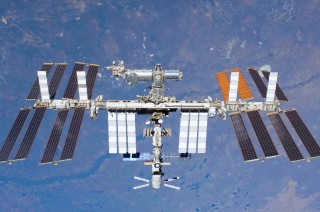

NASA
The International Space Station (as photographed by an STS-134 crew member on the space shuttle Endeavour, after the station and shuttle began their post-undocking relative separation).
The research will be led by Dr. Chia Soo, a UCLA professor of plastic and reconstructive surgery and orthopaedic surgery, who is member of the Eli and Edythe Broad Center of Regenerative Medicine and Stem Cell Research. Soo is also research director for UCLA Operation Mend, which provides medical care for wounded warriors. The study will test the ability of a bone-forming molecule called NELL-1 to direct stem cells to induce bone formation and prevent bone degeneration.
Other members of the UCLA research team are Dr. Kang Ting, a professor in dentistry who discovered NELL-1 and is leading efforts to translate NELL-1 therapy to humans, Dr. Ben Wu, a professor of bioengineering who modified the NELL-1 molecule to make useful for treating osteoporosis, and Dr. Jin Hee Kwak, an assistant professor of dentistry who will manage daily operations.
Based on results of previous studies supported by the NIH, the UCLA-ISS team will begin ground operations in early 2015. They hope that the study will provide new insights into the prevention of bone loss or osteoporosis as well as the regeneration of massive bone defects that can occur in wounded military personnel. Osteoporosis is a significant public health problem commonly associated with “skeletal disuse” conditions such as immobilization, stroke, cerebral palsy, muscular dystrophy, spinal cord injury and jaw resorption after tooth loss.
“NELL-1 holds tremendous hope, not only for preventing bone loss but one day even restoring healthy bone,” Ting said. “For patients who are bed-bound and suffering from bone loss, it could be life-changing.”
The UCLA team will oversee the ground operations of the mission in tandem with a flight operation coordinated by CASIS and NASA.
“A group of 40 rodents will be sent to the International Space Station U.S. National Laboratory onboard the SpaceX Dragon capsule, where they will live for two months in a microgravity environment during the first ever test of NELL-1 in space,” said Dr. Julie Robinson, NASA’s chief scientist for the International Space Station program at the Johnson Space Center.
“CASIS is proud to work alongside UCLA in an effort to promote the station as a viable platform for bone loss inquiry,” said Warren Bates, director of portfolio management for CASIS. “Through investigations like this, we hope to make profound discoveries and enable the development of therapies to counteract bone loss ailments common in humans.”
Prolonged space flights induce extreme changes in bone and organ systems that cannot be replicated on Earth.
“Besides testing the limits of NELL-1’s robust bone-producing effects, this mission will provide new insights about bone biology and could uncover important clues for curing diseases such as osteoporosis,” Wu said.
“NIH has been pleased to work with NASA and CASIS to encourage the use of the International Space Station as a unique microgravity environment that can test innovative hypotheses that will benefit human health on Earth,” said Dr. Joan A. McGowan, director of the division of musculoskeletal diseases at the National Institute of Arthritis and Musculoskeletal and Skin Diseases, part of the NIH.
“This research has enormous translational application for astronauts in space flight and for patients on Earth who have osteoporosis or other bone-loss problems from disease, illness or trauma,” Soo said. “We very much appreciate the dedicated review staff at CASIS and the Center for Scientific Review, the portal for NIH grant applications, who made this ISS-NIH effort possible.”
The research is supported by grants from the Center for the Advancement of Science in Space and National Institutes of Health. Additional funding and support are provided by the Eli and Edythe Broad Center of Regenerative Medicine and Stem Cell Research at UCLA, the UCLA School of Dentistry, UCLA Department of Orthopaedic Surgery and UCLA Orthopaedic Hospital Research Center.
About Eli and Edythe Broad Center of Regenerative Medicine and Stem Cell Research
The stem cell center was launched in 2005 with a UCLA commitment of $20 million over five years. A $20 million gift from the Eli and Edythe Broad Foundation in 2007 resulted in the renaming of the center. With more than 200 members, the Eli and Edythe Broad Center of Regenerative Medicine and Stem Cell Research is committed to a multi-disciplinary, integrated collaboration of scientific, academic and medical disciplines for the purpose of understanding adult and human embryonic stem cells. The center supports innovation, excellence and the highest ethical standards focused on stem cell research with the intent of facilitating basic scientific inquiry directed towards future clinical applications to treat disease. The center is a collaboration of the David Geffen School of Medicine, UCLA's Jonsson Comprehensive Cancer Center, the Henry Samueli School of Engineering and Applied Science and the UCLA College of Letters and Science.
To learn more about the center, visit http://www.stemcell.ucla.edu
About Operation Mend
UCLA Operation Mend is a groundbreaking program that provides returning military personnel from Iraq and Afghanistan, and service members wounded in training for battle, who suffer from severe facial and other medical injuries access to the nation's top plastic and reconstructive surgeons, as well as comprehensive medical and mental-health support for the wounded and their families.
To learn more about Operation Mend, visit http://operationmend.ucla.edu
About CASIS
About CASIS: The Center for the Advancement of Science in Space (CASIS) was selected by NASA in July 2011 to maximize use of the International Space Station (ISS) U.S. National Laboratory through 2020. CASIS is dedicated to supporting and accelerating innovations and new discoveries that will enhance the health and wellbeing of people and our planet.
For more information, visit www.iss-casis.org












